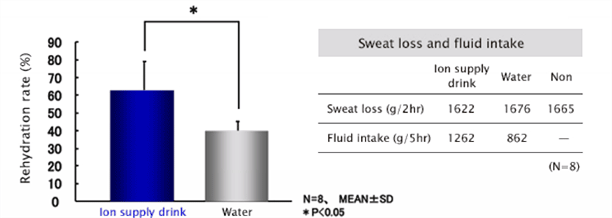Changes in body fluid volume and its composition during heavy sweating and the effect of fluid and electrolyte replacement
Morimoto T, Miki K, Nose H, Yamada S, Hirakawa K, Matsubara C
Japanese Journal of Biometeorology 1981; 18: 31-39
Purpose
The purpose of this study was to investigate what changes occur in the degree of involuntary dehydration*1 and body fluid composition after ad libitum consumption of an ion supply drink or water.
- *1When a large amount of water is consumed for rehydration after excessive sweating, the body attempts to dehydrate by arresting thirst and increasing the urine output to prevent the body fluid from being further diluted. As a result, more fluid in the body will be lost while the body fluid volume has still not recovered, leading to the progression of dehydration.
Methods
A randomized cross-over intervention trial*2 was conducted in eight healthy male subjects who were asked to consume an ion supply drink, water or not to consume any fluid. The subjects were asked to perform three sets of 15-minute step exercise during the test, with 15 minutes of rest between the sets, in a hot environment with an ambient temperature of 36.4℃ and a relative humidity of 70% (dehydration period). After two hours in the above described hot environment, the subjects stayed at rest for three hours in a thermoneutral environment of 25℃ and a relative humidity of 55% (recovery period). During the exercise and recovery periods, the subjects were allowed ad libitum access to the test beverage, and the fluid balance and blood properties were measured.
- *2A study in which each subject is treated under different conditions in a different order and the results are compared with each other.
Results
After the two hours of exercise, an average of 1600 g of sweat was lost during the trials. The amount of fluid intake during the two-hour dehydration period and the three hour recovery period was 1262 g and 862 g for the ion supply drink and water, respectively. The fluid intake rate, the ratio of fluid intake to the sweat rate, was 63% for the ion supply drink, which was significantly higher than that for water (40%).
Conclusion
Our study suggests that the degree of involuntary dehydration is mild when subjects consumed an ion supply drink, because a larger amount of fluid can be consumed compared to water.

- *3Rehydration rate (%): The ratio of fluid intake to sweat rate









